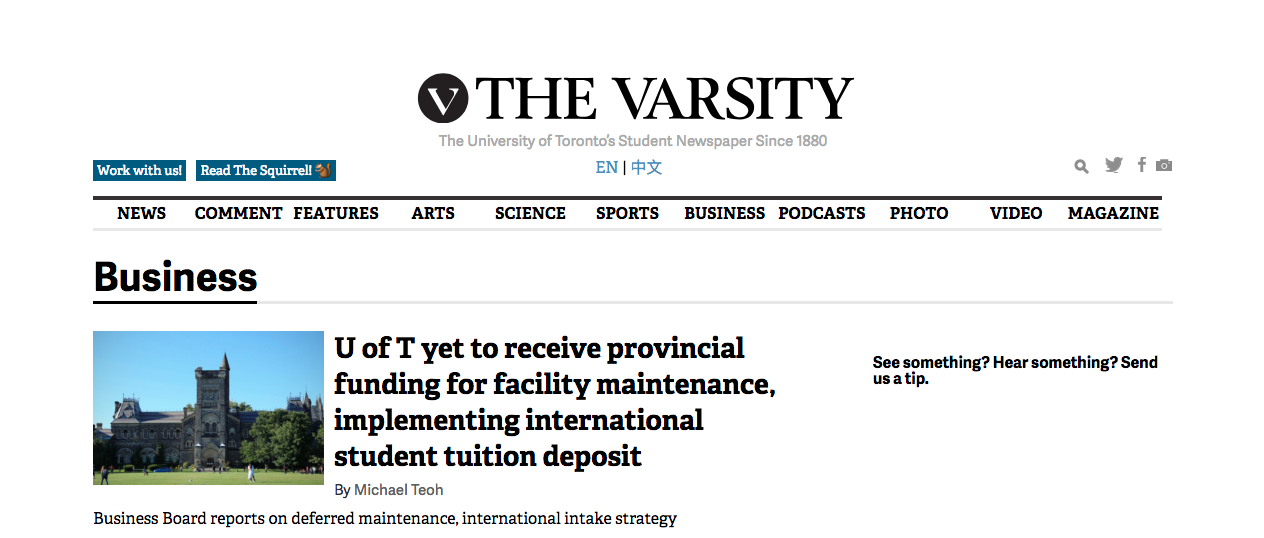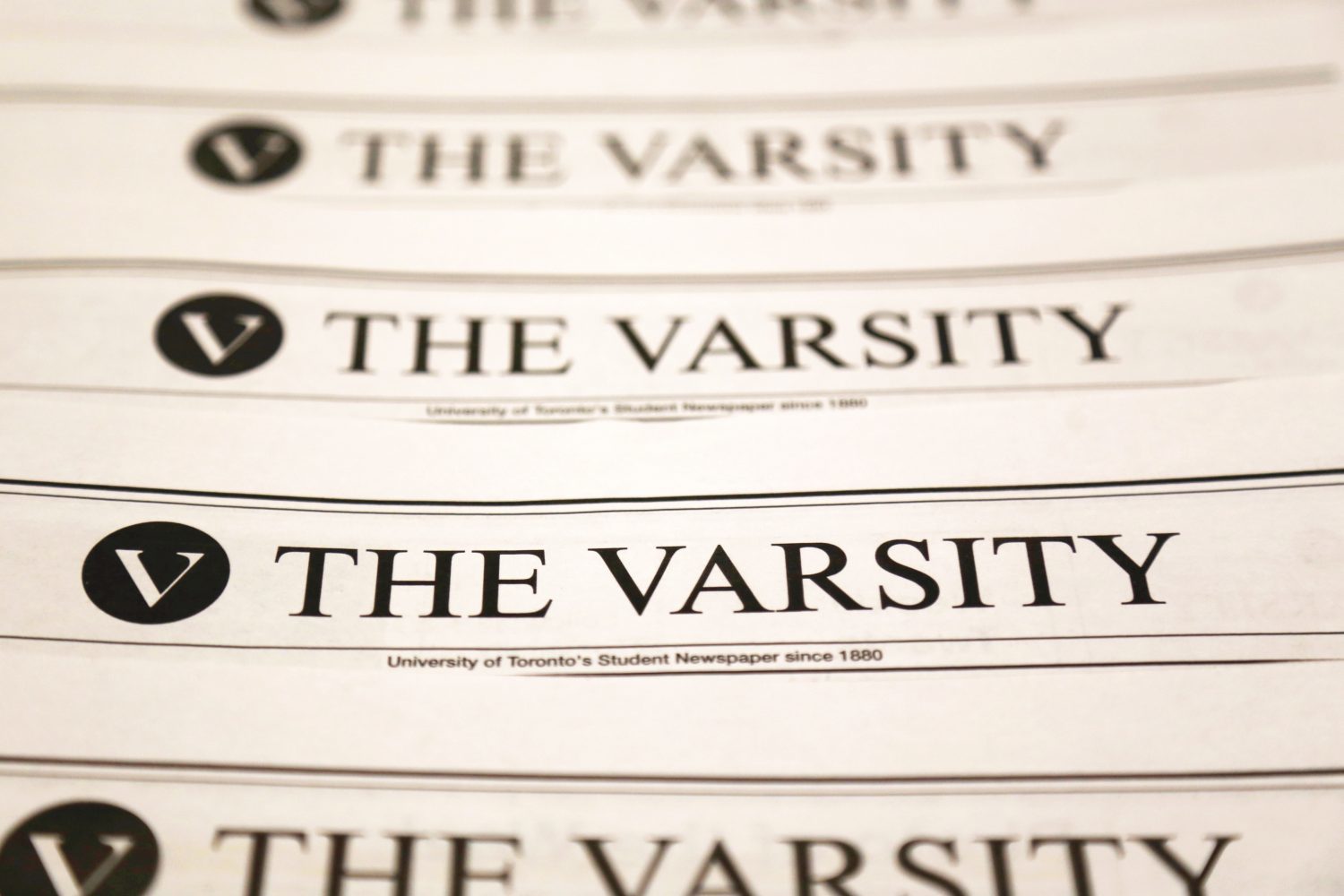When elections were held for the Varsity’s editor-in-chief in March 2018, one candidate’s platform promised the creation of a business section. That candidate, Jack O. Denton, won the paper’s top job and last October, he set into motion a rare experiment in Canadian student journalism.
The University of Toronto’s student paper of record is now one of only two Canadian University Press members – along with Ryerson University’s the Eyeopener – with a business section.
“I think my interest made me realize that there were a lot of business stories at U of T, that were going undercovered,” said Denton, a fourth-year political science student. “And at the same time we also understood that there were business stories from what’s going on at Rotman Commerce, to deeper coverage of university financials, to coverage of student startups, that didn’t really fit into any of the sections.”
These stories and others now have a dedicated home in the Varsity – and just in time. Proposed changes to financing postsecondary education in Ontario are providing ample material from which to draw stories. As one of the flagship student newspapers in Canada, the success or failure of the Varsity’s experiment might spur business sections at peer publications or suggest that student journalists are better off focusing their resources elsewhere.
In its first months of existence, major business stories with impact beyond the university have helped shape the section’s coverage. The first article featured in the section was about the University of Toronto’s research relationship with controversial Chinese technology company Huawei.
With the Ontario Progressive Conservative government proposing dramatic changes to the province’s student loan program, university student fees and tuition costs, there’s a greater need for business reporting in the student sphere.
Denton thinks the Varsity’s business section makes it uniquely positioned to report on these topics as they further develop, but there’s also a concern in the back of his mind.
“It’s ironic because if the Varsity newspaper’s fee, for instance, becomes optional,” he said, “I don’t know if the business section will continue to exist.”

In planning the section, Denton got in touch with working business journalists to refine his concept. He said he wanted expert opinions on what business journalism is and “how it should be differentiated from sort of bog standard news coverage.”
One of those journalists was Josh O’Kane of the Globe and Mail’s Report on Business section, himself a former editor-in-chief of the Brunswickan at the University of New Brunswick and Canadian University Press wire editor.
“My advice was largely framed around getting (Denton) to consider why a business section was important – that daily papers’ business coverage is usually framed around holding corporations and funds accountable for the money they use, given how much of it is invested by the public, and that he should consider how that would best translate to campus paper coverage,” O’Kane said in an email.
In O’Kane’s view, this translates to keeping student unions and various campus associations accountable.
He added that while “there are enough business-y headlines to justify the section,” a lot of the section’s feature stories wouldn’t necessarily fit into the priorities of a daily news organization’s business section. Other student papers should consider whether they truly have enough business stories to fill a separate section. O’Kane said that the size of the University of Toronto and its prestigious business school puts the Varsity in a unique place to offer such a section.
As of mid-February, the section had published more than 40 articles. There are stories about student entrepreneurs and the research activities of business professors. There are reports on major financial donations and how that money will be spent. There are explainers on the university pension plan and how non-essential student fees work. There are also opinion pieces and articles on consumer culture that are relevant to students like a personal essay about working Black Friday and an article examining multi-level marketing.

Matias Gutierrez, the business section’s associate editor, said the business section plays an informative role instead of just covering these topics from a political standpoint like a news section might.
“I think the business section and what it’s doing goes a long way for people to ask those sorts of questions to understand the budgeting and all of the financial moving parts that are involved in making policy decisions like that,” said the third-year English and ethics, society and law student.
A student focus was clear from the start, said Gutierrez.
“I remember when I first pitched for it they were like, yeah, we’re not going to be talking about stocks or larger sort of economics stories.”
Denton said the section fills a role that is both, in his words, “inward and outward-facing.” Outward is all about the information the section provides the community. At the University of Toronto, the university with the largest student population in Canada and a $2.68 billion operating budget this fiscal year, there’s no shortage of business activities to report on.
Inward-facing, it’s all about the Varsity’s writers. “We also serve people that work for us and we do as much as we can to provide them with opportunities for development,” he said. A business section allows the St. George campus’s informal “journalism school” – a formal program exists at the school’s Scarborough campus – to help develop their reporters’ skills in a new area. Despite changes in the industry, business reporting is still robust. Recent developments like the Globe and Mail’s Cannabis section and the Logic, a news startup covering the innovation economy, have added jobs to the industry covering niche business beats.
There is no special training for business staff writers at the Varsity – they learn on the job. But some roles have been filled with Varsity veterans familiar with the subject. “When we hired a business editor,” Denton adds, “We ensured that it was someone who was very comfortable with business context and language.”

Karen K. Ho, a freelance business and culture writer, and former Varsity alum, sees the paper’s business section as worthwhile because of the many intersections between money and university activities that affect students and the university as a whole.
“Trying to cram that into the general news section can be a challenge and a business section allows that focus on money to be more integral to many reported stories,” she said in an email.
“Everything on your campus has to do with money and there are lots of things you love and are concerned about that you can cover,” she said.
Though Ho remembers niche sections like sports and culture as being mostly dominated by a homogenous set of writers, the Varsity’s business section has brought more women and minority journalists into the fold.
It’s important, she added, for publications to actively create opportunities for inclusion rather than expecting new writers to make the first move.
“A media organization, be it student, local or national, has to understand they can’t wait for these groups of people to just come to them.”
While student papers across Canada vary widely in their amount of staff and budget, the Varsity’s deputy senior copy editor Julie Shi said the inclusion of business topics doesn’t pose a problem for the copy desk.
“In my personal opinion, it’s not too difficult when there’s a lot of numbers involved,” she said, noting that other sections in the past have had fairly technical pieces. But Shi, a third year English, history and book and media studies student, said that for some papers, it might not be worth the time and energy to build a business section.
“Especially if they’re either struggling or just making do with the sections that they have,” she said.
Business editor Michael Teoh, a third-year environmental studies, transnational studies and drama student, said that stories he’s previously covered for the news section, such as Ontario’s minimum wage increase and finances for student clubs, would now find their home in the business section.
The online readership for business pieces is promising, explained Teoh. Some topics – like provincial tuition cuts – have performed on par with coverage in the higher-profile news section, though others like the explainer on the university pension plan didn’t get as much traction.
“But we still get enough readership to encourage me to continue pursuing those sorts of stories that may not be tied to breaking news or stuff that’s going on, but explains how the university is managing its finances,” he said.
Though the burgeoning section hasn’t drawn contributors as easily as other areas of the paper, Teoh said students from the Rotman school who have otherwise not been involved in student journalism have started to express interest.
“Hopefully we can set a good precedent moving forward that will help maybe encourage other student papers to also pursue business sections,” he said.

